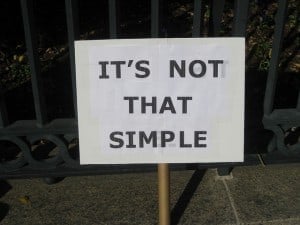The Dark Knight helped me pass my theology comps. Please don’t tell my professors this. Or my superiors. I’m even leery of letting you in on this dirty little secret of my priestly formation. But, in fact, one of the most practical reflections on applied theology I have received was given to me by Christopher Nolan and a husky-voiced Christian Bale.
The comprehensive exam in theology (or “comps”) is the last major assessment before a Jesuit is ordained. It can be a fraught experience. The test is spread out over several days, with written and oral portions, and is designed to cover all of theology, including its practical application in difficult pastoral situations. Sexual ethics, immigration reform, criminal justice, violence and war… you name it, and it is fair game for one of these questions.
With that world-spanning diversity and head-scratching controversy in play, I didn’t rely entirely on popular comic book movies to prepare, of course. I had by that point completed several years of theological study, and I committed to a several-month process of preparation before the test.
In fact, that preparation was when I first noticed something funny. One day, a practice question described a classroom of high school sophomores who erupt into a clash over the difference between Christianity and Hinduism. It was a complex and multi-layered issue… but all I could think of was telling that teacher to talk to them about Batman! I shrugged off the impulse and continued my study.
But the same thing happened when I came back to prepare another essay the next week. Then again the week after that. By the time the actual exam came around last April, I realized that this was no accident: situations of moral controversy have certain common traits that the Dark Knight helped me recognize. In fact, it was perfectly situated to do that! If it were a more complex movie,1 it would have been too complicated to apply easily to my life and all those pesky essays. A less complicated movie, and it may as well have been just another Marvel Studios yuk-fest like the Avengers (where the high of moral complexity involves the manipulative use of superhero trading cards).
And so, without further ado, here are two of the lessons that the “just right” complexity of The Dark Knight helps us see.
1) Whatever we choose, our choice is never perfect. In this scene, the Joker taunts Batman with an impossible choice. Either Harvey Dent or Rachel Dawes will die—all depending on which one he decides to save. And the Joker is on to something. Something inside of us hates the idea of a no-win scenario. We tend either to torment ourselves with second thoughts or oversimplify the situation to portray one side as good and the other as bad.
However, life is often full of these impossible choices. How should we deal with the child migration crisis? Do we deport these children back to situations of poverty and violence because they broke the law? Do we allow them to stay, separating them permanently from their family and giving desperate parents even more incentive to send their children on a dangerous journey? There is, quite literally, no way to satisfy all the moral demands upon us in a situation like that.
We must weigh the options carefully and choose the best option and acknowledge openly that our choice is imperfect. Every time we choose to save a Harvey, we leave behind some Rachel. Honestly acknowledging this makes us more likely to listen with an open mind when others disagree with us, and, perhaps most importantly, it is the first step to honoring those for whom our decision may not bring relief but suffering.
2) Everyone acts for a reason. Understanding that is the first step to understanding people. At first glance, this scene seems to confirm that the Joker is one of those guys who “just want to watch the world burn.” He (especially in this portrayal by Heath Ledger) is often regarded as the ultimate psychopath—acting completely irrationally, destroying for the sake of destruction. The most instructive part of this scene, however, is that even this apparently perfect psychopath has his motivation.
After all, he finishes describing his chaos by pointing out, “You know the thing about chaos? It’s fair.” As depraved as the Joker is, even he sees himself as doing something good. He is acting for the class-blind, race-blind, gender-blind destruction that only chaos can provide.2
This admission on the part of the Joker gives us a helpful insight for our moral controversies. It seems like it is part of the human DNA to act for reasons, for the sake of some sort of good, even if you are the most deranged villain Hollywood can come up with. Understanding this is the key to understanding all the parties in a moral conflict. Whenever we are faced with someone we disagree with, I submit that we should begin by trying to determine what good, what value, they are trying to uphold by their stance.
Notice, though, that understanding someone is not the same as agreeing with them. Just because the Joker wants to be fair does not justify any of his rampages! And in twelve years of ministry as a Jesuit, I have seen how some people in this world lack empathy themselves and even delight in causing discomfort and pain for others. But even when dealing with these fringe personalities, a little bit of understanding can make a big difference.
Once as a young Jesuit novice working at a day-center for the homeless, one of the clients was an older man who had consciously made the decision to drop out of “polite society.” He loved to extol the benefits of his life on the streets and say outrageous, belligerent, insensitive things designed to make a naive suburbanite volunteer uncomfortable.
And discomfort me they did—until I realized that that was exactly the payoff he was looking for. When I managed to reflect and realize that he was doing all of this just to get a reaction out of me, I was able to change how I reacted. Rather than get unsettled, I could come back right at him (after all, he wasn’t really looking for a fight) if I wanted or just ignore him if I didn’t. I won’t claim he became a fuzzy teddy bear overnight, but our relationship definitely improved.3
Most likely you will never have to answer a set of essays about “life, the universe, and everything,” but cramming divinity students are hardly the only set of people who have to deal with moral complexity. And while your moral reflection shouldn’t end with what is, after all, a movie based on a comic book, there is no reason it can’t begin from a couple of insights that The Dark Knight captures in its own memorable way.



